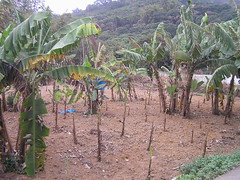Legislative Analyses
 Max Hirsch of Kyodo News has a nice article on the upcoming legislative election in January, which in many ways is the more important of the two elections. The whole thing is here:
Max Hirsch of Kyodo News has a nice article on the upcoming legislative election in January, which in many ways is the more important of the two elections. The whole thing is here:++++++++++
As eyes turn to Taiwan's presidential race, the outcome of which will impact on key security interests for Japan and the United States, another electoral showdown with arguably more important consequences draws near.Wednesday marks one month before Taiwan's general elections in which the island's ruling and opposition camps lock horns in races whose implications are reaching past parliament to reshape the overall political landscape.
For starters, the general elections Jan. 12 will serve as a litmus test for the presidential election on March 22, observers say. Whichever party beats its rival in parliamentary elections will pass on to its presidential candidate ''decisive momentum.'''
'A victory in general elections typically works out to be a big advantage going into the presidential election -- it enables a party to be seen as a winner, and voters like a winner,'' says Michael Boyden, director of Taiwan Asia Strategy Consulting.
That message is not lost on the opposition Nationalist Party amid speculation that a ''pendulum effect'' could turn a parliamentary win into a black mark for the presidential election.
That is, Taiwan -- which in 2000 emerged from nearly 60 years of sometimes brutal, one-party rule by the Nationalist Party (KMT) -- may not be ready to see one party dominate both the legislative and executive branches.
Hence, voters might swing back to whichever party that lost the parliamentary elections when casting their presidential ballots -- a scenario that KMT heavyweights dismiss.
''We need a victory in parliamentary elections in order to win the presidency,'' says KMT Secretary General Wu Dun-yi. ''Keeping our majority in parliament will give us the momentum we need before the presidential election.''
The KMT has enjoyed majority status in parliament since the lifting of martial law in 1987.[Nit: Actually, the pan-Blues had a majority; the largest single party was the DPP until last year when several members quit.]
In 2000, the Democratic Progressive Party pushed the KMT from the Presidential Office after the DPP's Chen Shui-bian won the presidential race that year -- a victory he repeated in 2004.
Next month, the DPP hopes to clinch parliament with at least 50 seats for itself and seven for allied parliamentarians in the unicameral, 113-seat body, says Chen, who also serves as DPP chairman.
The KMT seeks ''65 to 70 seats,'' says a KMT insider.
''Street cred'' and ''stature,'' Boyden says, will go to the presidential candidate whose party wins majority status in parliament.
Beyond implications for the presidential race, however, the general elections' outcome could radically alter Taiwan's relations with Japan and the United States, the island's chief security benefactor.
A halving of the parliament from its current 225 seats to 113 in the next session, for example, will see key legislative committees merge.
And among the committees to merge, Wu says, are the National Defense and Foreign and Overseas Chinese Affairs committees.
Combining those committees will put one group of parliamentarians in charge of both defense and diplomacy bills, by far the most important legislation in terms of relations with Tokyo and Washington, says Kharis Templeman of think tank Taiwan Foundation for Democracy.
Hence, how that committee is stacked as a result of the parliamentary elections will play a key role in foreign relations.
The sheer power of parliamentarians on such a committee, Templeman says, ''isn't necessarily a bad thing. Having a few powerful committee members could make it easier to negotiate across party lines. We could see quicker responses to foreign policy issues put to the legislature, like weapons systems offered by the U.S.''
Parliamentary gridlock led to Taiwan's stalling on a huge U.S. arms package, offered to the island in 2001.
The DPP blames the opposition for killing some 65 bids to consider the package in parliament, while the KMT slams the DPP for poorly budgeting the proposed weapons.
The parliament finally passed a reduced package earlier this year, allotting funds to buy a defensive missile system and antisubmarine warfare aircraft from Washington.
But Taipei's dawdling seriously damaged ties with Washington amid concerns there and in Tokyo that Taipei does not take its defense seriously.
China, which vows to unify Taiwan with the mainland, threatens to attack the island if it formalizes its de facto statehood.
Those threats concern Tokyo because any conflict in the Taiwan Strait could result in U.S. military intervention, which in turn could drag Japan's Self-Defense forces into the fight via a joint defense pact.
With both the DPP and KMT vowing to pass future arms bills, however, a streamlined parliament boasting more powerful incumbents promises to ease gridlock.
Thus, while the presidential race looms large in gauging Taiwan's future ties with key partners, it is the island's next parliament, and the impact of general elections on the presidential race, that pack the most political wallop, both at home and abroad.
+++++++++++++
A-gu has been putting together a wonderful tool for assessing the election, an interactive map on the Google Map platform. It's right on his blog; have a look.
[Taiwan]
Labels: 2007 Legislative Elections, 2008 presidential election, DPP, KMT
















1 Comments:
Thanks for the map plug.
And anyone who wants to help add data to the map, just let me know and I'll share administrative rights on it.
Post a Comment
<< Home